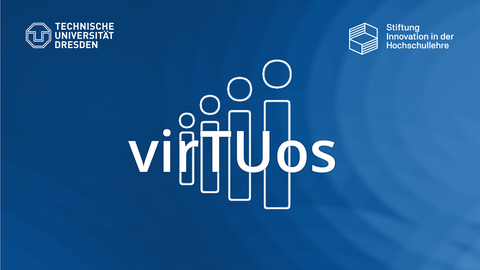Concept
Introduction
In its strategy as a University of Excellence, the TUD Dresden University of Technology (TUD) describes digitalization as a central driver of innovation. In addition to the aspects of digitalization research addressed there and the planned measures for further digitalization in administration, TUD focuses on digital approaches in teaching as an integral element of innovation, individualization, quality assurance and internationalization. These approaches are strengthened by a central support structure based at the Center for Interdisciplinary Learning and Teaching (ZiLL). Further training courses for knowledge and skills in the field of digital teaching are developed and offered together with the Center for Continuing Education (ZfW). In cooperation with the Centre for Information Technology and High-Performance Computing (ZIH) and the Else Kröner-Fresenius Centre for Digital Health (EKFZ), technological dimensions of the digitalization of teaching and learning processes are supported with consulting, training and service offers.
Problems and challenges
Many digital teaching solutions are currently insular and limited to specific fields of application. The coronavirus pandemic has highlighted the need to virtualize teaching formats. Technical scaling problems of the platforms and the need for a critical approach to digital technologies are challenges that need to be addressed. The aim is to integrate successful digital teaching methods into curricula in the long term.
- The need to virtualize course formats and to support learners and teachers in terms of higher education and digital didactics is an immense challenge.
- Platforms continue to reach their technical limits; scaling them for simultaneous operation is still a central task.
- Learners and teachers need to support each other more in dealing with digital technologies and critically reflect on the use of technology.
- In addition to a strategic goal orientation that strengthens openness and cooperation, it is particularly relevant for contemporary academic teaching that innovative and successfully evaluated virtualization is anchored in the development of study programmes, in the interpretation of examination law and in the curricula in the long term.
Conclusions
A position paper from 2020 formulates short, medium and long-term goals for the digital supplementation of teaching at the TUD. It emphasizes the importance of including the student perspective and the use of synergies to further develop digital teaching.
Innovation idea
virTUos stands for the innovative redesign of digital teaching at TUD Dresden University of Technology. Three central areas of activity have been identified in which virTUos operates: Internship & Assessment Formats, Collaboration & Internationalization and Competence Development & Open Teaching. These areas are addressed by two innovation teams that develop hybrid and virtual teaching and learning formats in an interdisciplinary exchange.

